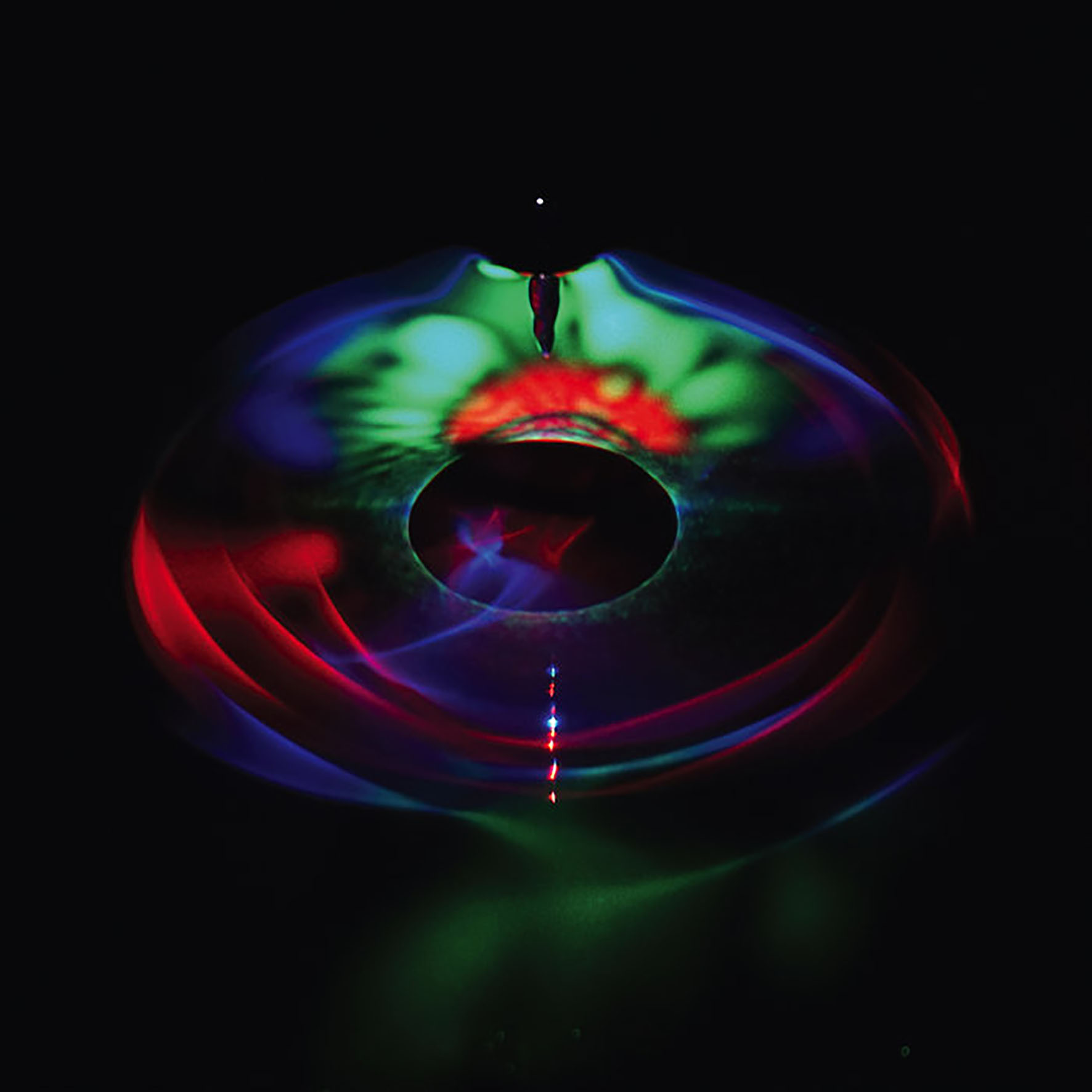William Basinski, "On Time Out of Time"
 This latest release is more of a diversion than a fresh addition to the canon of William Basinski masterworks, as it was originally composed for a pair of installations for an exhibition in Berlin. In keeping with theme of the show ("Limits of Knowing"), he stepped outside of his usual working methods to craft floating ambient soundscapes sourced from recordings captured by the Laser Interferometer Gravitational-Wave Observatory (LIGO). Looked at another way, however, On Time Out of Time could be seen as Basinski's normal working methods taken to their ultimate extreme: instead of harvesting sounds from decaying tapes a few decades old, he is now harvesting billion-year-old sounds created by merging black holes. As far as singular, awe-inspiring cosmic events go, that is fairly hard to top, but it must be said that Basinski on his own has a more melodically and harmonically sophisticated sensibility than most (if not all) black holes. As such, the appeal of On Time Out Of Time lies more in the ingenious transformation of the source material than in the finished compositions (though they are quite likable).
This latest release is more of a diversion than a fresh addition to the canon of William Basinski masterworks, as it was originally composed for a pair of installations for an exhibition in Berlin. In keeping with theme of the show ("Limits of Knowing"), he stepped outside of his usual working methods to craft floating ambient soundscapes sourced from recordings captured by the Laser Interferometer Gravitational-Wave Observatory (LIGO). Looked at another way, however, On Time Out of Time could be seen as Basinski's normal working methods taken to their ultimate extreme: instead of harvesting sounds from decaying tapes a few decades old, he is now harvesting billion-year-old sounds created by merging black holes. As far as singular, awe-inspiring cosmic events go, that is fairly hard to top, but it must be said that Basinski on his own has a more melodically and harmonically sophisticated sensibility than most (if not all) black holes. As such, the appeal of On Time Out Of Time lies more in the ingenious transformation of the source material than in the finished compositions (though they are quite likable).
It might be hyperbole to describe it as a golden age, but there was a ten-year stretch that began in the mid-’80s in which Steve Roach, Vidna Obmana, Alio Die, and a few other artists churned out an impressive run of sublime ambient albums.Unusually for a William Basinski release, On Time Out of Time feels like a part of that tradition, albeit the more star-gazing side rather than the tribal/ritualistic side (for obvious reasons, in this case).That is not necessarily a good thing or a bad thing, but it feels like odd territory for Basinski's work to bleed into, as he always seemed more like an art scene guy with considerably different influences than most ambient artists.That stylistic tourism is most evident in the album's epic title piece, though Basinski’s take on space music is an appealingly bleary and impressionistic one.That trait only becomes fully apparent with focused, attentive listening though, as "On Time Out of Time" feels mostly like a time-stretched state of suspended animation, as cold, spectral smears of sound languorously wax and wane to form a shifting haze of vaguely disquieting harmonies.It reminds me of the way a ray of sunlight can sometimes reveal an unseen world of floating dust particles.It would be reductive to say that the piece is merely a vaporous, dreamlike reverie though–it just happens to have an extremely subtle and slow-building arc, quietly blossoming into occasional passages of undulating warmth or darkly lysergic crescendos of blurred dissonance.In general, however, the trajectory is always moving steadily towards greater warmth, culminating in a tenderly lovely final stretch of heavenly chords that dissolves into hissing, clicking near-silence.
The album's considerably shorter second piece ("4(E+D)4(ER=EPR)") is quite a bit different though, returning to more recognizably structured and loop-based territory.As such, it is by far the more instantly gratifying of the two, which is an unfortunate irony: the title piece was clearly the more ambitious and difficult undertaking by a wide margin.By comparison, "4(E+D)4(ER=EPR)" is far more modest in scope, as the ringing deep space transmissions are quickly consumed by a see-sawing pattern of lush, soft-focus chords.While "two alternating chords, endlessly repeated" is theoretically not the strongest theme for a ten-minute composition, Basinski has made a career out of turning the simplest fragments into something poignant and mesmerizing and he does an impressive job of pulling off that feat yet again here.As with the title piece, the magic lies in the details, as there is a swirling, howling, and glimmering storm at the heart of "4(E+D)4(ER=EPR)" that fleetingly breaks through the spaces between the warm chords.The main reason that it works better is simply because there is a consistent pulse to anchor the piece and give it a sense of forward motion (even if it is illusory, as the title track is the one that actually undergoes a significant transformation).
I often have mixed feelings about Basinski's albums that depart from his signature aesthetic of deteriorating tape loops, as he discovered and mastered an ingenious compositional tool that has yielded some absolutely beautiful work.I imagine attempting to compose similarly stellar albums while pointedly avoiding one’s greatest strength is a tricky proposition, but endlessly doing the same thing is doubtlessly a depressing one.It is definitely a balancing act.And as a fairly passionate William Basinski fan, I always feel a bit like a boorish audience member shouting at a brilliant magician to keep doing my favorite trick over and over again whenever I have a lukewarm reaction to something new that he tries.I am delighted that he keeps doing it though.As far as this particular experiment is concerned, On Time Out of Time is a solid album, but it falls short of being one of Basinski's more essential works simply because it sounds exactly like what it was meant to be:the soundtrack to a larger, more complete work.Admittedly, "4(E+D)4(ER=EPR)" stands quite well on its own, but it is a bit too brief to fully immerse me.In any case, On Time Out of Time is best appreciated as a headphone album, as its most exquisite pleasures are nuanced, slowly unfolding ones that reveal themselves only with deep listening.Aside from the source material, that is probably the trait that most makes this a significant and unique addition to Basinski's oeuvre.



